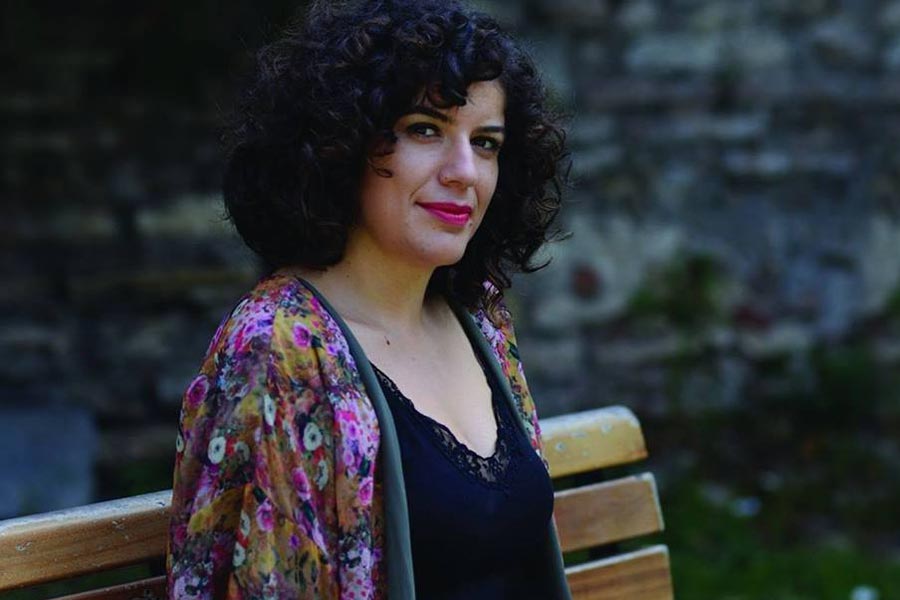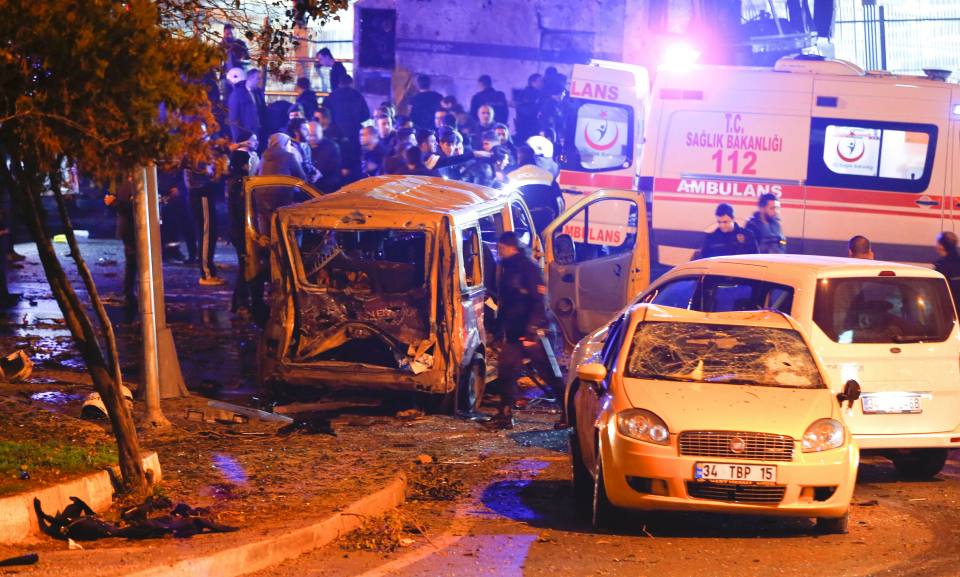Aysen Guven, Television presenter at Hayatin Sesi TV and arts editor at Evrensel Daily Newspaper.
5 July 2016
Aysen Guven shares her observations of developments in Turkey in relation to press freedom.
In terms of press freedom we are witnessing one of the most difficult periods in Turkey. Everyday someone is put on trial, questioned and / or arrested. The political environment changes so fast in Turkey, such that it resembles the ad-hoc movement in financial stock markets. As I prepare my statement on 29 June 2016 the following developments had happened in Turkey.
- Three people arrested for taking part in the daily rotating editor in chief role
The issue of press freedom resurfaces mostly with the issue of Kurdish question. The pressure on the press escalated following president Erdogan’s statement that the negotiations between the state and Kurdish movement representatives “were put on ice” and a period of conflict was initiated. For example the “pro-Kurdish” newspaper Ozgur Gundem was not subject to any court proceedings or arrests at the time of peace negotiations between the state and the representatives of the Kurdish people. However once the negotiations were “put on ice” the newspaper became subject to intense questioning over its articles and news stories. In response to the arrest and the court proceedings against its chief editor, the paper launched a campaign calling out for individuals to take on the responsibility of chief editor for a day as a way to show support for the paper during this difficult time.
As part of this ongoing campaign journalists, human rights activists, intellectuals and artists took the role of chief editor for a day. In total 56 people took on the chief editor responsibility, 50 were questioned, 16 had court proceedings brought against them, 3 were arrested. Of these only 6 people had their cases dropped due to lack of grounds for legal action. On 20 June 2015, Reporters Without Borders’ Turkey representative, Erol Onderoglu; the writer, Ahmet Nesin; and the president of Turkey’s Human Rights Foundation, Sebnem Korur Fincanci were detained for taking part in this campaign. They have now been released.
- A new low in press freedom – 37 journalists detained in Turkey’s prisons
According to the National Union of Journalists in Turkey there are 37 journalists who are currently arrested and convicted. Moreover, the Press Freedom Index compiled by Reporters without Borders cites Turkey as one of the most difficult countries in which to be a journalist. Turkey is listed as 151 of 180 nations that have been surveyed, confirming that it is one of the least free countries in terms of press freedom.
- Rise in the number of criminal investigations for insulting the president
The most common criminal investigations in Turkey are ones that relate to “insulting” the president and it has become a very popular topic of discussions. According to the formal announcement by the Justice Minister Bekir Bozdag, 1845 people have had criminal investigations brought against them for allegedly insulting the president.
- Censorship extended to Germany
President Erdogan went as far as to make a formal complaint against German comedian Jan Bohmermann for allegedly insulting him in one of his lyrics broadcasted on TV. The German Chancellor Angela Merkel further escalated the situation by apologising for Bohmermann’s “intentionally hurtful” poem and the government approved Bohmermann’s criminal prosecution.
- Criminal proceedings against Evrensel reporters
Evrensel reporters have also come under fire for their coverage of developments in Turkey and court proceedings have been brought against journalists who are alleged to have engaged in “terrorist propaganda” or “promoted and/or praised perpetrators of terrorism”. Additionally, other excuses are also utilised against reporters who critique the Government, for example Ender Imrek and A. Cihan Soylu who both write for Evrensel Newspaper in Turkey recently were subject to court proceedings for allegedly insulting the president.
- Cutting of the financial livelihood of opposition newspapers
As a result of its critical news coverage, Evrensel has also become a target by the Press Advertisement Body which has blocked official advertisements in the newspaper without any criminal or civil proceedings to justify this intervention. Access to formal advertisements is a key source of income for the press (including Evrensel Newspaper) and is now being used by the State to force the opposition press to broadcast in favour of the AKP government.
- Can Dundar and Erdem Gul
Can Dunar and Erdem Gul have exposed the AKP government’s complicity in the supply of weapons to Islamic extremist groups in Syria. Both were convicted of obtaining and publishing secret documents belonging to the state. Can Dundar was sentenced to 5 years and 10 months imprisonment, and Erdem Gul was sentenced to 5 years.
- Censorship of opposition TV Stations – a series of fines and warnings for Hayatin Sesi TV
The TV and Radio regulator (also known as RTUK) is at the heart of the government clampdowns on opposition media sources. The regulator is overseen and controlled by AKP. There is a so-called cross party board that oversees the regulator however the AKP and pro-establishment parties dominate board. Moreover the nationalist party MHP, often votes in complicity with the ruling government to censor and punish oppositional views. This is increasingly the case due to the lack of public opposition to the abuse of power by the regulator.
In the past month Hayatin Sesi received four fines from RTUK. These related to a series of broadcasts relating to current developments in Turkey. In particular, Hayatin Sesi received a warning and fine 14,359 TL (approx. £3800) for its reporting of the terrorist attack on 13 March in Ankara, a warning for its reporting of the ISIS attack in the area of Istiklal Street in Istanbul, and another fine of 14 359 TL for its special report on the curfews in Cizre. The TV station has also been warned that should these “offences” be repeated that it faces forced closure of 10 days and possible revocation of its licence. There are two more penalties being discussed by RTUK which relate to Hayatin Sesi but decision have not been made at the time of writing.
- IMC TV censored by Turksat Satellite
IMC TV, another opposition TV station which has been highly critical of the AKP government has also had its license revoked by TurkSat Satellite as part of the clamp down and censorship of those critical of the AKP government. The station is now only able to broadcast from the alternative platform the HotBird satellite
- The closing of Ozgur Gun (Freedom Day) TV
The alternative TV station Ozgur Gun which broadcasts from Diyarbakir was also subject to one day closure and 14,359 TL fine by RTUK. The rational for the fine and censorship was the channel’s broadcast by a reporter on 20 January commenting on the opening of fire on civilians trying to rescue injured people in Cizre, and the resulting death of 2 people and further 12 injured.
- Censorship of Social Media
Following the recent terrorist attacks at Istanbul Ataturk Airport, the AKP government’s first knee jerk reaction was to ban broadcasting and commentary on the attacks, and intervene to block or slow down access to social networking sites such as Twitter and Facebook. This has become the default position of the AKP government which has sought to deprive the public of news and communications at times of desperate need. It is widely felt that the purpose of such censorship is to prevent the exposure of the government’s complicity and or failure with regards the growth of Islamic extremism in Turkey. The public continued to face difficulties accessing social networking sites the day after the terrorist attack in Istanbul Ataturk Airport. The Information Technology and Communications Institute announced that they considered all digital footage and images of the attacks on social networking sites as serving “the aims of terrorism”.

